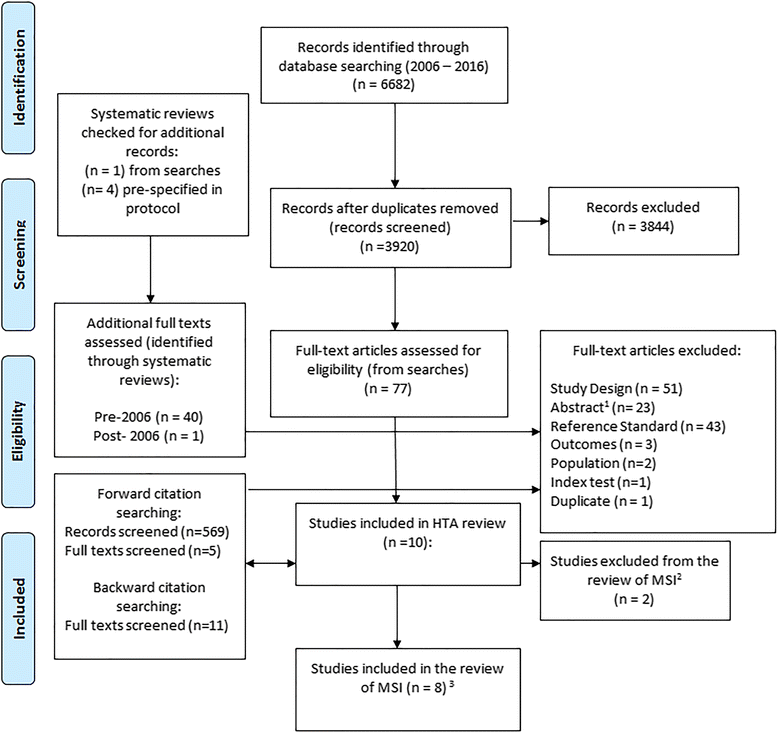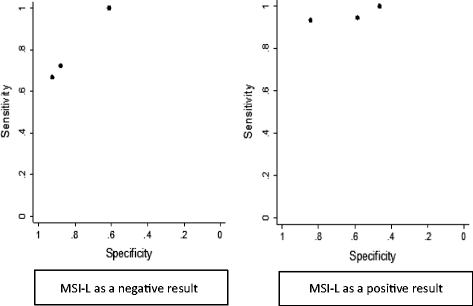A systematic review of test accuracy studies evaluating molecular micro-satellite instability testing for the detection of individuals with lynch syndrome
- PMID: 29221446
- PMCID: PMC5723028
- DOI: 10.1186/s12885-017-3820-5
A systematic review of test accuracy studies evaluating molecular micro-satellite instability testing for the detection of individuals with lynch syndrome
Abstract
Background: A systematic review was conducted to assess the diagnostic test accuracy of polymerase chain reaction (PCR)-based microsatellite instability (MSI) testing for identifying Lynch syndrome in patients with colorectal cancer (CRC). Unlike previous reviews, this was based on assessing MSI testing against best practice for the reference standard, and included CRC populations that were unselected, age-limited or high-risk for Lynch syndrome.
Methods: Single- and two-gate diagnostic test accuracy studies, or similar, were identified, assessed for inclusion, data extracted and quality appraised by two reviewers according to a pre-specified protocol. Sensitivity of MSI testing was estimated for all included studies. Specificity, likelihood ratios and predictive values were estimated for studies that were not based on high-risk samples. Narrative synthesis was conducted.
Results: Nine study samples were included. When MSI-Low results were considered to be negative, sensitivity estimates ranged from 67% (95% CI 47, 83) to 100% (95% CI 94, 100). Three studies contributed to estimates of both sensitivity and specificity, with specificity ranging from 61% (95% CI 57, 65), to 93% (95% CI 89, 95). Good sensitivity was achieved at the expense of specificity. When MSI-L was considered to be positive (effectively lowering the threshold for a positive index test result) sensitivity increased and specificity decreased. Between-study heterogeneity in both the MSI and reference standard testing, combined with the low number of studies contributing to both sensitivity and specificity estimates, precluded pooling by meta-analysis.
Conclusions: MSI testing is an effective screening test for Lynch syndrome. However, there is significant uncertainty surrounding what balance of sensitivity and specificity will be achieved in clinical practice and how this relates to specific characteristics of the test (such as the panel of markers used or the thresholds used to denote a positive test).
Keywords: Diagnostic testing; HNPCC; Lynch syndrome; Microsatellite instability; Systematic review; Test accuracy.
Conflict of interest statement
Ethics approval and consent to participate
Not applicable.
Consent for publication
Not applicable.
Competing interests
The authors declare that they have no competing interests.
Publisher’s Note
Springer Nature remains neutral with regard to jurisdictional claims in published maps and institutional affiliations.
Figures


References
-
- Morak M, Koehler U, Schackert HK, Steinke V, Royer-Pokora B, Schulmann K, Kloor M, Hochter W, Weingart J, Keiling C, et al. Biallelic MLH1 SNP cDNA expression or constitutional promoter methylation can hide genomic rearrangements causing lynch syndrome. J Med Genet. 2011;48(8):513–519. doi: 10.1136/jmedgenet-2011-100050. - DOI - PubMed
-
- Niessen RC, Hofstra RM, Westers H, Ligtenberg MJ, Kooi K, Jager PO, de Groote ML, Dijkhuizen T, Olderode-Berends MJ, Hollema H, et al. Germline hypermethylation of MLH1 and EPCAM deletions are a frequent cause of lynch syndrome. Genes Chromosomes Cancer. 2009;48(8):737–744. doi: 10.1002/gcc.20678. - DOI - PubMed
-
- Vasen HF, Blanco I, Aktan-Collan K, Gopie JP, Alonso A, Aretz S, Bernstein I, Bertario L, Burn J, Capella G, et al. Revised guidelines for the clinical management of lynch syndrome (HNPCC): recommendations by a group of European experts. Gut. 2013;62(6):812–823. doi: 10.1136/gutjnl-2012-304356. - DOI - PMC - PubMed
-
- Møller P, Seppälä T, Bernstein I, Holinski-Feder E, Sala P, Evans DG, Lindblom A, Macrae F, Blanco I, Sijmons R et al: Cancer incidence and survival in Lynch syndrome patients receiving colonoscopic and gynaecological surveillance: first report from the prospective Lynch syndrome database. Gut 2015, Online first (9 December 2015). - PMC - PubMed
Publication types
MeSH terms
LinkOut - more resources
Full Text Sources
Other Literature Sources

